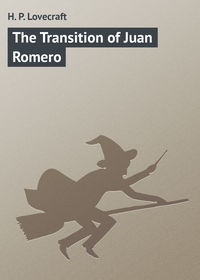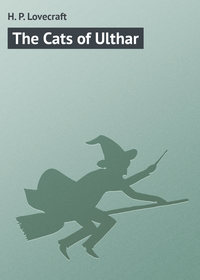
Полная версия
At the Mountains of Madness
This dissection seemed to be a greater task than had been expected, for, despite the heat of a gasoline stove in the newly raised laboratory tent, the deceptively flexible tissues of the chosen specimen – a powerful and intact one – lost nothing of their more than leathery toughness. Lake was puzzled as to how he might make the requisite incisions without violence destructive enough to upset all the structural niceties he was looking for. He had, it is true, seven more perfect specimens; but these were too few to use up recklessly unless the cave might later yield an unlimited supply. Accordingly he removed the specimen and dragged in one which, though having remnants of the starfish arrangements at both ends, was badly crushed and partly disrupted along one of the great torso furrows.
Results, quickly reported over the wireless, were baffling and provocative indeed. Nothing like delicacy or accuracy was possible with instruments hardly able to cut the anomalous tissue, but the little that was achieved left us all awed and bewildered. Existing biology would have to be wholly revised, for this thing was no product of any cell growth science knows about. There had been scarcely any mineral replacement, and despite an age of perhaps forty million years, the internal organs were wholly intact. The leathery, undeteriorative, and almost indestructible quality was an inherent attribute of the thing’s form of organization, and pertained to some paleogean cycle of invertebrate evolution utterly beyond our powers of speculation. At first all that Lake found was dry, but as the heated tent produced its thawing effect, organic moisture of pungent and offensive odor was encountered toward the thing’s uninjured side. It was not blood, but a thick, dark-green fluid apparently answering the same purpose. By the time Lake reached this stage, all thirty-seven dogs had been brought to the still uncompleted corral near the camp, and even at that distance set up a savage barking and show of restlessness at the acrid, diffusive smell.
Far from helping to place the strange entity, this provisional dissection merely deepened its mystery. All guesses about its external members had been correct, and on the evidence of these one could hardly hesitate to call the thing animal; but internal inspection brought up so many vegetable evidences that Lake was left hopelessly at sea. It had digestion and circulation, and eliminated waste matter through the reddish tubes of its starfish-shaped base. Cursorily, one would say that its respiration apparatus handled oxygen rather than carbon dioxide, and there were odd evidences of air-storage chambers and methods of shifting respiration from the external orifice to at least two other fully developed breathing systems – gills and pores. Clearly, it was amphibian, and probably adapted to long airless hibernation periods as well. Vocal organs seemed present in connection with the main respiratory system, but they presented anomalies beyond immediate solution. Articulate speech, in the sense of syllable utterance, seemed barely conceivable, but musical piping notes covering a wide range were highly probable. The muscular system was almost prematurely developed.
The nervous system was so complex and highly developed as to leave Lake aghast. Though excessively primitive and archaic in some respects, the thing had a set of ganglial centers and connectives arguing the very extremes of specialized development. Its five-lobed brain was surprisingly advanced, and there were signs of a sensory equipment, served in part through the wiry cilia of the head, involving factors alien to any other terrestrial organism. Probably it has more than five senses, so that its habits could not be predicted from any existing analogy. It must, Lake thought, have been a creature of keen sensitiveness and delicately differentiated functions in its primal world – much like the ants and bees of today. It reproduced like the vegetable cryptogams, especially the Pteridophytes, having spore cases at the tips of the wings and evidently developing from a thallus or prothallus.
But to give it a name at this stage was mere folly. It looked like a radiate, but was clearly something more. It was partly vegetable, but had three-fourths of the essentials of animal structure. That it was marine in origin, its symmetrical contour and certain other attributes clearly indicated; yet one could not be exact as to the limit of its later adaptations. The wings, after all, held a persistent suggestion of the aerial. How it could have undergone its tremendously complex evolution on a new-born earth in time to leave prints in Archaean rocks was so far beyond conception as to make Lake whimsically recall the primal myths about Great Old Ones who filtered down from the stars and concocted earth life as a joke or mistake; and the wild tales of cosmic hill things from outside told by a folklorist colleague in Miskatonic’s English department.
Naturally, he considered the possibility of the pre-Cambrian prints having been made by a less evolved ancestor of the present specimens, but quickly rejected this too-facile theory upon considering the advanced structural qualities of the older fossils. If anything, the later contours showed decadence rather than higher evolution. The size of the pseudo-feet had decreased, and the whole morphology seemed coarsened and simplified. Moreover, the nerves and organs just examined held singular suggestions of retrogression from forms still more complex. Atrophied and vestigial parts were surprisingly prevalent. Altogether, little could be said to have been solved; and Lake fell back on mythology for a provisional name – jocosely dubbing his finds “The Elder Ones.”
At about 2:30 A.M., having decided to postpone further work and get a little rest, he covered the dissected organism with a tarpaulin, emerged from the laboratory tent, and studied the intact specimens with renewed interest. The ceaseless antarctic sun had begun to limber up their tissues a trifle, so that the head points and tubes of two or three showed signs of unfolding; but Lake did not believe there was any danger of immediate decomposition in the almost subzero air. He did, however, move all the undissected specimens close together and throw a spare tent over them in order to keep off the direct solar rays. That would also help to keep their possible scent away from the dogs, whose hostile unrest was really becoming a problem, even at their substantial distance and behind the higher and higher snow walls which an increased quota of the men were hastening to raise around their quarters. He had to weight down the corners of the tent cloth with heavy blocks of snow to hold it in place amidst the rising gale, for the titan mountains seemed about to deliver some gravely severe blasts. Early apprehensions about sudden antarctic winds were revived, and under Atwood’s supervision precautions were taken to bank the tents, new dog corral, and crude aeroplane shelters with snow on the mountainward side. These latter shelters, begun with hard snow blocks during odd moments, were by no means as high as they should have been; and Lake finally detached all hands from other tasks to work on them.
It was after four when Lake at last prepared to sign off and advised us all to share the rest period his outfit would take when the shelter walls were a little higher. He held some friendly chat with Pabodie over the ether, and repeated his praise of the really marvelous drills that had helped him make his discovery. Atwood also sent greetings and praises. I gave Lake a warm word of congratulations, owning up that he was right about the western trip, and we all agreed to get in touch by wireless at ten in the morning. If the gale was then over, Lake would send a plane for the party at my base. Just before retiring I dispatched a final message to the Arkham with instructions about toning down the day’s news for the outside world, since the full details seemed radical enough to rouse a wave of incredulity until further substantiated.
III
None of us, I imagine, slept very heavily or continuously that morning. Both the excitement of Lake’s discovery and the mounting fury of the wind were against such a thing. So savage was the blast, even where we were, that we could not help wondering how much worse it was at Lake’s camp, directly under the vast unknown peaks that bred and delivered it. McTighe was awake at ten o’clock and tried to get Lake on the wireless, as agreed, but some electrical condition in the disturbed air to the westward seemed to prevent communication. We did, however, get the Arkham, and Douglas told me that he had likewise been vainly trying to reach Lake. He had not known about the wind, for very little was blowing at McMurdo Sound, despite its persistent rage where we were.
Throughout the day we all listened anxiously and tried to get Lake at intervals, but invariably without results. About noon a positive frenzy of wind stampeded out of the west, causing us to fear for the safety of our camp; but it eventually died down, with only a moderate relapse at 2 P.M. After three o’clock it was very quiet, and we redoubled our efforts to get Lake. Reflecting that he had four planes, each provided with an excellent short-wave outfit, we could not imagine any ordinary accident capable of crippling all his wireless equipment at once. Nevertheless the stony silence continued, and when we thought of the delirious force the wind must have had in his locality we could not help making the more direful conjectures.
Конец ознакомительного фрагмента.
Текст предоставлен ООО «ЛитРес».
Прочитайте эту книгу целиком, купив полную легальную версию на ЛитРес.
Безопасно оплатить книгу можно банковской картой Visa, MasterCard, Maestro, со счета мобильного телефона, с платежного терминала, в салоне МТС или Связной, через PayPal, WebMoney, Яндекс.Деньги, QIWI Кошелек, бонусными картами или другим удобным Вам способом.













